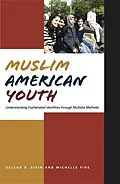Since the terrorist attacks of September 11, 2001, and the subsequent ?war on terror,? growing up Muslim in the U.S. has become a far more challenging task for young people. They must contend with popular cultural representations of Muslim-men-as-terrorists and Muslim-women-as-oppressed, the suspicious gaze of peers, teachers, and strangers, and police, and the fierce embodiment of fears in their homes.
With great attention to quantitative and qualitative detail, the authors provide heartbreaking and funny stories of discrimination and resistance, delivering hard to ignore statistical evidence of moral exclusion for young people whose lives have been situated on the intimate fault lines of global conflict, and who carry international crises in their backpacks and in their souls.
The volume offers a critical conceptual framework to aid in understanding Muslim American identity formation processes, a framework which can also be applied to other groups of marginalized and immigrant youth. In addition, through their innovative data analytic methods that creatively mix youth drawings, intensive individual interviews, focused group discussions, and culturally sensitive survey items, the authors provide an antidote to ?qualitative vs. quantitative? arguments that have unnecessarily captured much time and energy in psychology and other behavioral sciences.
Muslim American Youth provides a much-needed road map for those seeking to understand how Muslim youth and other groups of immigrant youth negotiate their identities as Americans.
Autorentext
Michelle Fine is a Distinguished Professor of Social Psychology, Women's Studies and Urban Education at the Graduate Center, CUNY. She is the author of a long list of award-winning books in the fields of education and psychology, including Framing Dropouts, Becoming Gentlemen, and Speedbumps: A Student Friendly Guide to Qualitative Research and The Unknown City, both with Lois Weis. She is also coeditor of NYU Press's Qualitative Studies in Psychology series.
Zusammenfassung
Since the terrorist attacks of September 11, 2001, and the subsequent war on terror, growing up Muslim in the U.S. has become a far more challenging task for young people. They must contend with popular cultural representations of Muslim-men-as-terrorists and Muslim-women-as-oppressed, the suspicious gaze of peers, teachers, and strangers, and police, and the fierce embodiment of fears in their homes.
With great attention to quantitative and qualitative detail, the authors provide heartbreaking and funny stories of discrimination and resistance, delivering hard to ignore statistical evidence of moral exclusion for young people whose lives have been situated on the intimate fault lines of global conflict, and who carry international crises in their backpacks and in their souls.
The volume offers a critical conceptual framework to aid in understanding Muslim American identity formation processes, a framework which can also be applied to other groups of marginalized and immigrant youth. In addition, through their innovative data analytic methods that creatively mix youth drawings, intensive individual interviews, focused group discussions, and culturally sensitive survey items, the authors provide an antidote to qualitative vs. quantitative arguments that have unnecessarily captured much time and energy in psychology and other behavioral sciences.
Muslim American Youth provides a much-needed road map for those seeking to understand how Muslim youth and other groups of immigrant youth negotiate their identities as Americans.
Inhalt
Acknowledgments Foreword by Carola Suárez-Orozco: Designated "Others": Young, Muslim, and American
Growing Up in the Shadow of Moral Exclusion
Meet Aisha: Challenging and Laughing Her Way through Suspicion, Surveillance, and Low Expectations
Muslim Americans: History, Demography, and Diversity
Meet Sahar: A Hyphen with Holes in It...Allowing Her to Sometimes Fall Through
Moral Exclusion in a "Nation of Immigrants”: An American Paradox
Meet Yeliz: A Young Woman of Conviction, Distinct across Contexts
The Weight of the Hyphen: Discrimination and Coping
Meet Ayyad: "A Regular Cute Guy"
Meet Taliya: Seeking Safe Spaces for Social Analysis and Action
Contact Zones: Negotiating the Space between Self and Others
Meet Masood: Grounded in Islam, Crossing Borders
7 Researching Hyphenated Selves across Contexts
Appendix A: Survey Measures
